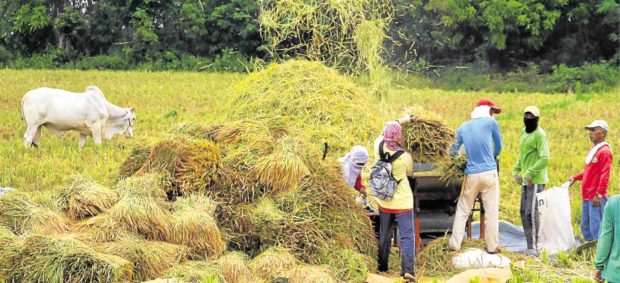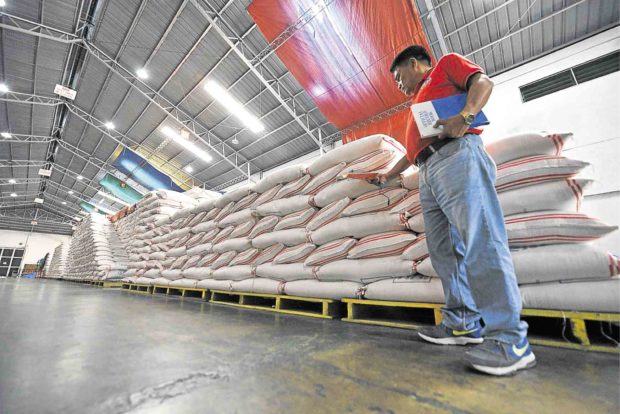Rice importation still needed, says PhilRice

Farmers thresh newly harvested palay at a farm in Labrador town, Pangasinan province. —WILLIE LOMIBAO
SCIENCE CITY OF MUÑOZ—Rice stocks from last year’s harvests and this year’s cropping season assure the country of supply for three months but there is still need to import as augmentation during the lean months of production, the Philippine Rice Research Institute (PhilRice) here said.
A team of PhilRice economists, led by Deputy Executive Director Flordeliza Bordey, collected data for a study on rice security, self-sufficiency and competitiveness.
Highest production
“We have rice stock of almost 3 million metric tons of rice in the first quarter of 2018 that is enough for 87 days,” the PhilRice said in a statement.
The study said the country achieved the highest production last year at 19.3 million MT of palay. This was equivalent to 12.5 million MT of milled rice.
Article continues after this advertisementTogether with the 900,000 MT of imported rice and the carry-over stock of 2.7 million MT from 2017, the country has 16.1 million MT in the first quarter of this year.
Article continues after this advertisementThe prevailing stock will be boosted by the 2.9 million MT harvest in the first quarter.
Filipinos consume 110 kilograms of rice per year but the demand also includes raw materials for value-added products, animal feed and spoilage, thus increasing the annual consumption rate.

A National Food Authority employee inspects the agency’s rice stock at its warehouse in Baguio City amid reports of low supply of cheap rice in the market. —EV ESPIRITU
Necessary
Importation remains necessary because the bulk of palay harvest occurs at the fourth quarter of each year, PhilRice said. “It should be understood that there is seasonality of rice production, which is 23 percent in the first quarter, 21 percent in the second quarter, 16 percent in the third quarter and 40 percent in the fourth quarter,” it said.
“Therefore, the timing for the importation is of the essence, as the stock of rice goes down especially during the third quarter, which constitutes the lean months.”
The imported rice would help guard against sudden price fluctuations in the market, it added.
Resignation call
During a Senate hearing on Tuesday, Senators Grace Poe and Bam Aquino called on National Food Authority (NFA) Administrator Jason Aquino to resign for allegedly failing to act on the agency’s mandate to maintain a buffer stock and stabilize the supply and prices of rice.
Sought for comment on calls for Aquino’s resignation, NFA spokesperson Rex Estoperez said: “The senators are in the legislative branch while we are in the executive branch. Both have the right to say what they want to say. As for us, we are still trying to find concrete and immediate solutions to replenish our stocks.”
Aquino was unavailable on Thursday. —WITH A REPORT FROM KARL R. OCAMPO